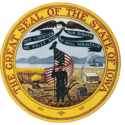32 territories have become states in the history of the United States. Their stories have included plenty of drama — conflicts over central philosophical concepts, religious differences, legal challenges, human rights issues, duels, even wars have been part of the statehood story for many of the territories which achieved statehood in the past.
Iowa had a smoother path to statehood. Iowa was part of the Louisiana Purchase. It was part of the Louisiana Territory, then part of the Michigan Territory, then the Wisconsin Territory, until at last it became the Iowa Territory.
Along the way, Iowa voted several times on the important question of whether to become a state or continue as a territory. Discussions at the time were mostly about taxes. As a territory, Iowa didn’t have to pay federal taxes, and the majority of the people in Iowa liked it that way. They had a governor appointed and paid for by Washington, and their focus was on making the wilderness into a good place to live. Clearing land, building homes, and plowing and planting acreage were the big items on Iowans to-do lists, and many of them just didn’t care much about the rest of the country.
Iowa also had two political parties, the Democrats and the Whigs. The President of the United States at the time was a Whig, and Iowa’s Whigs liked the idea of having their governor appointed by the Whig president. They were concerned that a Democrat might win if they began electing their own governor. Between the Whigs and the self-focused pioneers, Iowa wasn’t too excited about statehood.
Iowa Territory called itself a commonwealth, and their first few commonwealth vs. statehood votes were a win for the commonwealth — territory — option.
Iowa grows.
Iowa turned out to be an excellent place to settle, and the population grew steadily. As simple survival stopped being the focus of life in Iowa, the people moving in from states wanted the influence and stability of statehood. They had a representative in Congress, just as the territory of Puerto Rico has, but that person could not vote. Residents of the territory couldn’t vote in presidential elections, either.
The new president, James K. Polk, was a Democrat.
The newcomers wanted to keep the same U.S. citizenship, with full rights and responsibilities, that they had enjoyed when they lived in the states. The Whigs wanted to be able to vote for their own leaders, now that both the president and the governor were Democrats. The people who had settled into Iowa saw that statehood would bring prosperity. A new referendum was held and statehood won.
Iowa wrote a constitution and fought over its boundaries, ending up bigger than Congress had wanted it to be, but smaller than the territory of Iowa had been.
In December of 1846, President James K. Polk signed a law making Iowa the 29th state.
Takeaways
The disadvantages to being a territory instead of a state were the same in 1846 as they are now. Iowa had no real voice in the political life of the United States, no say in the laws that governed their people, no choice when it came to their president. While they were most concerned with survival, the people of Iowa accepted this. They were worried about taxes, since they were few in number and barely scraping by.
As Iowa developed, the people saw that statehood would bring prosperity. They wanted to participate in American democracy. They decided that they were ready for statehood.
The discussion was always about being ready for statehood. Iowa never considered hanging around for a century as a territory; they voted against statehood until they were ready for the full rights and responsibilities of statehood.
Puerto Rico — in spite of the challenges created by the debt crisis and the hurricanes — is ready for statehood. It’s time to rebuild, and it’s right to rebuild Puerto Rico as a state. Join us in the progress toward statehood.








No responses yet